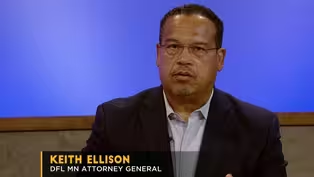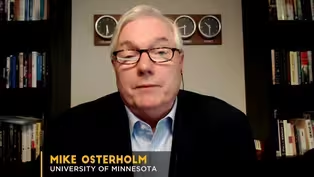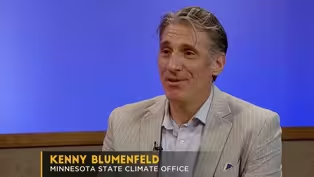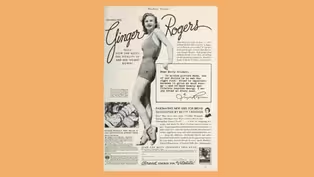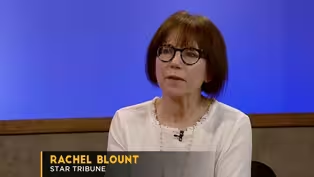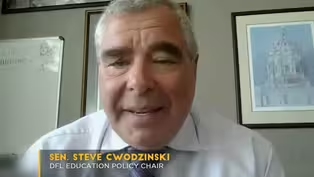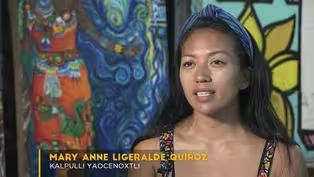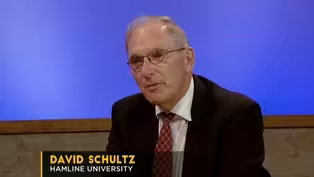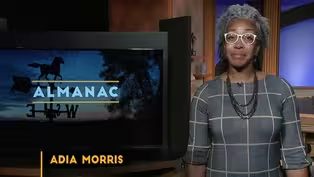
Former Lawmaker Panel
Clip: Season 2024 Episode 1 | 10m 27sVideo has Closed Captions
Former Lawmakers talk special session
DFLers Jeff Hayden and Susan Kent and Republicans Michelle Benson and Fritz Knaak hash out this week’s news.
Problems playing video? | Closed Captioning Feedback
Problems playing video? | Closed Captioning Feedback
Almanac is a local public television program presented by TPT

Former Lawmaker Panel
Clip: Season 2024 Episode 1 | 10m 27sVideo has Closed Captions
DFLers Jeff Hayden and Susan Kent and Republicans Michelle Benson and Fritz Knaak hash out this week’s news.
Problems playing video? | Closed Captioning Feedback
How to Watch Almanac
Almanac is available to stream on pbs.org and the free PBS App, available on iPhone, Apple TV, Android TV, Android smartphones, Amazon Fire TV, Amazon Fire Tablet, Roku, Samsung Smart TV, and Vizio.
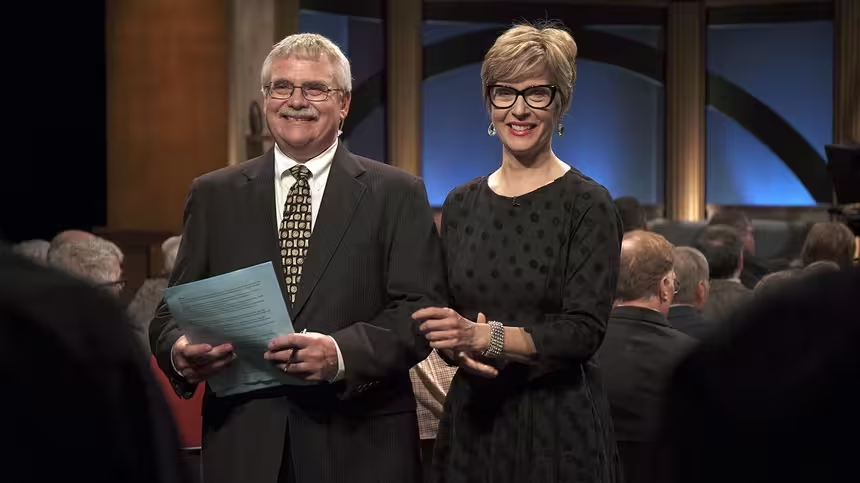
A Minnesota Institution
"Almanac" is a Minnesota institution that has occupied the 7:00 p.m. timeslot on Friday nights for more than 30 years. It is the longest-running primetime TV program ever in the region.Providing Support for PBS.org
Learn Moreabout PBS online sponsorship- Republican voices for Governor Walz to call a special session got louder this week as their concerns about the new restrictions on school resource officers joins their concerns about the new law legalizing marijuana.
DFL lawmakers join the Governor in saying that all of these issues can be resolved during next year's session.
We've got an esteemed group of former state senators to share some opinions on these issues.
DFL is up first, Jeff Hayden, former senate leader, that's a label you can also attach to Susan Kent.
Republicans with us tonight, former Senate Majority Leader, no Senate Leader.
Yeah.
Michelle Benson.
And we round out with the group with the Fritz Knaak, former State Senator.
Special session needed, Senator Benson?
- I think the SRO might rise to the level of needing some fixes.
I'm not a fan of governors or attorney generals writing letters to say, "No, this is what we really meant."
They don't hold up in court very well.
Let's see how these first days of school go.
And if the school boards and teachers really get concerned about what's happening in their schools, then I think they're gonna have to do something.
- Senator Hayden?
- Yeah, I don't think so.
I think that we can just kind of clarify, I mean, you know, Attorney General is on today and they said that the law is clear that SROs can be in the schools and that this is the way that they should conduct themselves, which is no different than any other officer.
So I think that it is actually okay.
I think that there may be some political issues going on behind the scenes, potentially from the police union.
- [Eric] Who's stirring this up?
- Well right now it's actually coming out of the police and there's no surprise that Republicans would take advantage of that as a political issue.
But what I'm seeing, I mean I've been involved as a city attorney for over four decades and I've never seen a hot mess like this quite.
Yeah, it's really nasty and you had people showing up, for example, at a Republican event and they were school officials, police captains and the like, that generally don't like to associate themselves for professional reasons with anything political, much less a political party.
And to me that was an indication of the gravity of the thing.
It's really, really, really a tough situation.
- Well I think it's interesting that Fritz thinks that he hasn't seen many hot messes and- (Fritz and Susan laughing) - I've seen a few.
- I would think so.
- Yeah.
- You know, I really do think partly is thinking about how it would work if they were to try to do it as a special session.
We're already in September, you know, there's gonna be a lot of conversation that takes place to figure this out.
And so if they were gonna do a special session, given that we know that there's a big drumbeat to address the cannabis bill and a bunch of other things.
I, how they could focus this and do it effectively with a good agreement.
I just don't practically see that happening.
So the work, have the conversations, bring the people to the table, make sure everybody feels comfortable with it, and that it's not just some political thing, but, you know, really be prepared to get at it in February.
- [Eric] Yeah.
- This is the second kind of big law that people have got questions about though, you know, of course the marijuana law is the first one.
Did the legislature maybe act too fast when it came to crafting this bill?
- You know, we were over there, they moved at pretty good speed and I think all of us would say that and they would say that.
There was a lot of pent up demand and a lot of new people that wanted to put new things on the table.
As it relates to the cannabis, there's kind of two things.
One, they still have a chance next year as they put together this cannabis working group and the group that's gonna manage this to like kind of change a few things that they think that there is an issue.
I don't think that there is a rush to do that.
The second thing, and I said this to Fritz, maybe the last time we were here, like republicans really didn't participate in it because a lot of them didn't want it at all.
And then when it became law they said, "Oh, here's all the things that we could have done."
So I just think there's a little bit of like, you know, like politics, imagine that, involved in the conversation about cannabis.
- Well Cathy, I think there was a good question though.
I mean I think that, you know, there's a lot of politics in all of this.
I would agree.
But we're former members of the Senate and we all know that there's committees that are specialized to deal with issues and they have to be specialized 'cause the issues are very important.
And the particular issue with respect to SROs really only came up, at least what you saw publicly, really only came up once.
One Republican, you know, and was largely probably being ignored for the rest of that committee meeting anyway, made the point, "Hey, maybe this is a problem."
And it came up in the education committee.
It's the sort of thing that should have probably been in front of another committee and, you know, you ask about whether it's a rush.
Those are the kinds of mistakes and I would argue that this was a mistake that tend to get fixed when there is, when it goes to different committees that should be dealing with the issues.
- A stop in the judiciary committee.
- Right.
- The police watch that committee, they would've said, "Here's how this impacts our ability to be SROs."
One more stop and one more committee.
- [Fritz] Yeah, that's exactly right.
- Would've gotten the language right.
Would've said publicly, this is what we mean, you're misreading it.
Or the comfort language that everybody now says was there, would've been called out and the legislative intent would've been absolutely clear.
- But having served on the education committee for a lot of years, we've done SRO legislation just like this, in different ways, with different aspects to it, going back to 2017, 2018 for sure.
But this is where it happens.
And there are so many stakeholder groups in the education committee that, you know, I'm, there was plenty of opportunity for law enforcement to be aware of what's going on.
- But when we talked about restraints in health committees, and Jeff, you'll remember there was a lot of discussion.
There were multiple committee stops, there were working groups.
Before you make decisions this big, you really need to make sure everybody's involved.
And those were hard decisions about people who were mentally ill and dangerous and how were they gonna be treated and what staff training was gonna be supported.
It was more than a year of conversation.
- Yeah, but I mean, you know, this is why I think that's political.
I mean, the idea that we're just trying to tell officers that like if a kid is mouthy, you don't put him in a choke hold.
However, if he is displaying somewhere, where he is gonna do harm to himself or to someone else that you can, that's how we operate in society today.
So I think that there may be- - And again, - Yeah.
- The education committee does this.
This is not new- - But how long did they talk about it before they made this change?
So the fact that the police were surprised means it wasn't vetted.
If they're impacted- - Well.
- But Michelle, we both have been in the minority, right?
And our job in the minority, we've both been in this and we've all have.
Fritz, you're always in the minority.
But anyways, (laughing) your job was actually to kind of point that out, was to kind of say, listen, you're going too fast.
This is an issue.
I'm gonna bring an amendment.
I'm gonna use my pulpit, I'm gonna use my platform, I'm gonna have a press conference.
And they didn't do any of it.
And then they waited till after session to call the special session.
- Oh now, come on.
Now you're blaming the Republicans for it.
- I'm just suggesting that, listen, when I was in the minority and you've gaveled me down a time or two.
- I did not.
- You did too.
(laughing) When I went too far, right?
And objecting to something.
I mean, you know, and she was probably right to gavel me down.
But my point is that's her job.
Well but Cathy raised a process issue and I think that that's one we can all agree was overlooked.
Here, when you're in a hurry, you tend to probably ignore some of the steps that need to be taken.
And that clearly happened here.
And despite what the Attorney General said, there was no clarification.
I read the thing and I needed to, there was no clarification in that order.
The key was what he said at the end, which is he said, "They got all these parties together, they all met, and oh, by the way, this opinion doesn't apply to anything that they raised."
- [Eric] Right.
- You know, that's a "whoa," you know, that's a key thing.
- But bigger- - Excuse me, speaking of politics for just a moment here.
So the Supreme Court appointments that were made by Governor Walz, they're being kind of poo-pooed by the GOP as being too political.
Why is that?
- I think the Chief Justice was absolutely qualified, and I congratulate her and Lori Gilday stood next to her.
Respectfully, I think that someone should have more experience than Governor Walz's other appointment.
If you look at Paul Tison, well respected, well-known longtime lawyer, I think we need a little more experience than being general counsel for the governor, I think.
- And after Barry Anderson retires in October.
- [Fritz] Right.
- There's gonna be, there'll be another appointment.
There'll be seven Democrats and no Republicans.
And I wonder Lawyer Knaak, if the Republican Convention next year is going to move to endorse a Supreme Court candidate to run against, it would be the Associate Justice.
- Well that's my concern, frankly, is when you appoint somebody as political as this person and that's old school, you know, that's back dating back for decades.
That's the way people used to get appointed.
You appoint somebody like that, that's purely political and you're dealing with a court that now is making major issues.
I mean, we have abortion in Minnesota largely because of decisions of that court.
All of a sudden that becomes political.
And I, by appointing it in this context right now, I think we're gonna end up with a endorsement, frankly.
- It'll be a challenge.
- Yeah, it'll be a challenge.
- I think it's just unfair to say it's purely political, you know, I mean it is very dismissive of, I mean we can talk about whether a candidate has decent qualifications or not.
The governor made his judgment and I'm sure he wouldn't have made a purely political - and I still remember - if he didn't think that - Mr. Procaccini - Timothy Lueck - wasn't capable.
- Made an appointment that was very similar and I forgot the judge's name and he went on the Supreme Court and then went on to the federal judgeship and it was kind of very similar there, where there was some issues about his experience.
So governors, you know, kind of do this all the time.
And Fritz, with all due respect, this is a product of winning elections and Democrats have been winning elections.
- You won't, it's absolutely true.
It's a product of winning elections.
I am concerned that a Republican endorsement of a judge is not going to help a judge win in this.
- You brought this behind the scenes tonight.
A real excellent panel.
(all laughing) Really good stuff.
Thanks.
(upbeat music)
Video has Closed Captions
Clip: S2024 Ep1 | 5m 5s | Keith Ellison discusses charges in a $9.5M Medicaid fraud case. (5m 5s)
Video has Closed Captions
Clip: S2024 Ep1 | 6m 16s | Mike Osterholm on new variants, boosters and a rise in COVID cases. (6m 16s)
Video has Closed Captions
Clip: S2024 Ep1 | 4m 48s | Kenny Blumenfeld assesses the deepening drought across Minnesota. (4m 48s)
A Famous Starlet and a Folksy State Fair Performance
Video has Closed Captions
Clip: S2024 Ep1 | 3m 11s | answer index file question & Charlie Parr (3m 11s)
Video has Closed Captions
Clip: S2024 Ep1 | 5m 9s | Star Tribune’s Rachel Blount tells the history behind a historic new league. (5m 9s)
Video has Closed Captions
Clip: S2024 Ep1 | 5m 6s | Mary Lahammer talks with legislators about the debate over restraint use on students. (5m 6s)
Video has Closed Captions
Clip: S2024 Ep1 | 4m 33s | Kaomi Lee talks with dancers performing at a new cultural celebration. (4m 33s)
Trump Indictments and SCOTUS gifts
Video has Closed Captions
Clip: S2024 Ep1 | 5m 56s | David Schultz unpacks the ramifications of this week’s national political news. (5m 56s)
Weekly Essay | Adia Morris | Rearranging
Video has Closed Captions
Clip: S2024 Ep1 | 1m 44s | Adia gives us a life hack for redecorating. (1m 44s)
Providing Support for PBS.org
Learn Moreabout PBS online sponsorship
- News and Public Affairs

Top journalists deliver compelling original analysis of the hour's headlines.

- News and Public Affairs

FRONTLINE is investigative journalism that questions, explains and changes our world.












Support for PBS provided by:
Almanac is a local public television program presented by TPT
